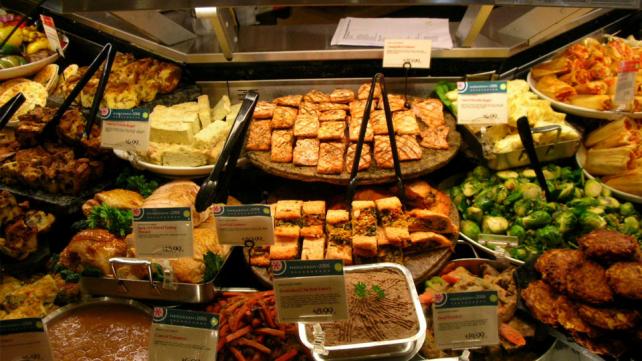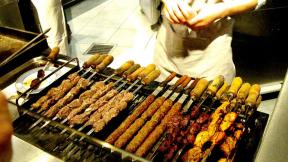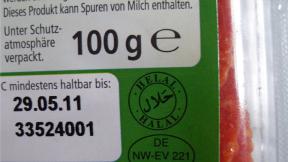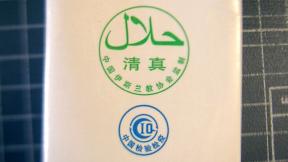
Often times Muslim consumers tend to assume 'Kosher' is similar to 'Halal'. Although the slaughtering rituals of Jewish people resemble those of Muslims; kosher and halal are two different entities carrying a different meaning and spirit. Muslims, therefore, are provided with the following basic information about Kosher so they can exercise care in distinguishing halal from kosher.
Kashrut (in Hebrew) is the system of Jewish dietary laws. Kosher (kashur in Hebrew) means 'fit, or proper for use' according to Jewish law. Examples of kosher are: the meat of the 'fore quarter*' of the cattle slaughtered ritually, fruits, vegetables, all fish that have fins*, Kosher wines*, Kosher cheeses*, Kosher gelatin*.
The opposite of Kosher, as applied to food in Treif (in Yiddish), or trefah (in Hebrew) meaning 'not suitable for use', or 'forbidden'. Trefah literally means 'torn by a wild beast' (Exodus 22:30). Examples of Trefah are: blood, swine, rabbit*, all shell fish*, wild birds such as wild hen*, wild duck*, and the birds of prey.
(*) These food items exhibit a marked difference between kosher and Halal as well as trefah and haram. The differences are explained elsewhere in this section.
Caution to Muslim Consumers:
Halal is a comprehensive Islamic term encompassing not only the matters of food and drink, but all other matters of daily life. Islam being the final and perfect way of life for humanity, it supersedes all the previously revealed religions including Christianity and Judaism. The rituals in all matters were perfected by God (al-Quran 5:3)
According to Islamic Jurisprudence, no one except God can change forbidden (Haram) things into lawful (halal) for vice-versa. It is forbidden for people to change the lawful (Halal) things into unlawful (Haram), or vice-versa.
Halal is a unique Islamic concept and eating zabiha (Islamically slaughtered) meat is a distinguishing part of a Muslim's identity as expressed by Prophet Muhammad, peace and blessings be upon him.
Salient differences between kosher and halal are:
Islam prohibits all intoxicating alcohols, liquors, wines and drugs. kashrut regards their wines kosher. Hence food items and drinks showing the kosher symbol containing alcohol are not halal.
Gelatin is considered Kosher by many Jews regardless of its source of origin. If the gelatin is prepared from non-zabiha, Muslims consider it haram (prohibited). Hence foods items such as marshmallows, yogurt, etc., showing kosher symbols are not always halal.
Enzymes (irrespective of their sources even from non-kosher animals) in cheese making are considered mere secretion (pirsah b'almah) according to some kashrut organizations, hence all cheeses are considered kosher by many Jews. Muslims look for the source of the enzyme in cheese making. If it is coming from the swine, it is considered haram(forbidden). Hence cheeses showing kosher symbols may not be halal.
Jews do not pronounce the name of God on each animal while slaughtering. They feel that uttering the name of God, out of context, is wasteful. Muslims on the other hand pronounce the name of Allah on all animals while slaughtering.
The salient differences between kosher and halal have been illustrated so that Muslim consumers can distinguish halal from kosher.
Muslims in non-Muslim countries should strive to follow the Islamic injunctions in their diet (as well as in every walk of life) and establish their own businesses and institutions to cater to the needs of the Muslim Ummah. By doing so, not only the identity of the Muslims will be preserved, but they will be recognized and respected for their beliefs and practices.
Differences within Kosher:
There are different sects within Judaism and there are several hundred Jewish Kosher authorities in the US who certify Kosher based on extremely liberal to extremely conservative rules. Therefore it is difficult to come up with one uniform opinion regarding Kosher practices. A symbols "k" for kosher is not governed by any authority. Any manufacturer can use it at will. A website guiding Jews about Kosher states "it may take a great deal of detective work to ascertain the standard that a particular rabbi is using." For this reason many Muslims when buying anything kosher look for "u" in a circle which are more conservative Kosher symbol.
"Hanukkah dishes" by Ms Jones from California, USA - Happy Hanukkah!. Licensed under Creative Commons Attribution 2.0 via Wikimedia Commons - http://commons.wikimedia.org/wiki/File:Hanukkah_dishes.jpg#mediaviewer/File:Hanukkah_dishes.jpg








Comments
I was under the impression (like many muslims) that kosher was halal for muslims.this article has opened my eyes.since reading your article I have talked to many of my friends/relations and have given them the information.you have done a great service to all muslims.may Allah bless you.
Location
Its very simple Kosher is not Halal. Slaughtered without the name of Allah is not Halal.
Location
Being Jewish, I was impressed by some of the knowlege of the author about Jewish dietary laws, but there was a number of things he was misquoted or was wrong about. Therefore I gave a middle rating.
Location
mahsallah.. thanks for helping us know more abou this point
Location
jazakumllah kull khayr.. pedfect article to enlighten muslims about the difference between kosher and halal... i used to think that they are te same when it comes to food.. jazakumllah kull khayr
Location
I must admit I have learned a lot from the article and the first corresponding comment. I think it is important for us all to strive for love and understanding between all faiths, but to go as far as making kosher and halal meat one and the same is plain folly and unacceptable. Halal meat can never be considered kosher and unfortunately, kosher meat cannot be halal as the rules are very clear ... and have different requirements. However, progress can be made on other foods like fish and fruits and vegetables. As there are still differences, I dont see why we cannot have one certification that clearly states the foods as being kosher as well as halal by the strictest criteria. many fish, fruits and vegs will fall under this category and so it will make a good start to brining us closer.
Location
I must admit my knowledge of halal has been improved by reading this article, despite my fundamental disagreement with the statements about Islam. That said, nobody should use this article to improve their understanding of kashrut, as it is clearly incorrect, or at least incomplete, in a number of areas. (1) "Forequarter of cow": As is correctly mentioned, the forequarter of properly slaughtered cattle is kosher, but the rest of the cow is also kosher, with the exception of certain fats as well as cuts from the hindquarters that fail to correctly extract the sciatic nerve. This is as true of cattle as is it is of any mammal that has both ruminates ("chews its cud") and has cloven (split-in-two) hooves.(2) Fruits & Vegetables: These are kosher only if (a) they're grown outside the land of Israel (which, politics aside, includes about the eastern half of the Sinai, the hills of northwestern Jordan, the "Bashan" region of southwestern Syria, the southern third of Lebanon, in addition to all the land presently controlled by the modern nation-state of Israel) or (b) they were grown in the "land of Israel" (i.e. within the aforementioned borders) AND they are properly tithed (and also, for fruit grown on trees, they were not taken from the tree within the first 3 years, or for both fruits and vegetables and grains, not harvested during the "year of rest", every 7 years.)(3) Fish: In order for a fish to be kosher, it must not only have fins, but a certain KIND of fins (the translucent kind most fish have)...not only that, but they must ALSO have scales, and even at that, a certain TYPE of scales (ctenoid or cycloid). Not only that, but the fish must ALSO have these scales throughout its entire life, so fish such as sturgeon and swordfish are not acceptable.(4) Wines: Wines, as well as any other product derived from grapes, are only kosher if they are produced, some say "by religious Jews", but others say the real test is "without the work of non-Jews". This applies to wine equally as to grape jam or jelly, or even to grapeseed oil. Because of this difference (religious Jews required vs. a simple prohibition against non-Jews producing it), some say that the automated process employed, for instance, among many Napa Valley (California) vineyards, makes the wines permitted. This is not a widely-held opinion, however. Regardless, to say that "all wines" are kosher, is an eggregious error. On the other hand, there is a clear point of difference here between "kosher" and "halal" in that Jewish teaching does not prohibit the [moderate] consumption of alcohol, while halal completely forbids it.(5) Cheese: There is a diversity of opinion on cheeses. Most poskim agree that hard cheeses are not kosher unless curded with an agent other than animal-derived rennet (despite what a previous response said about kosher-animal-derived-rennet). The most common such agent is derived from some kind of kelp or other seaweed. (I'm not too certain about the specifics.) The problem here is the rennet, which is derived from an enzyme produzed in the intestine of calves (I think. don't ask me what the person who discovered it was doing when they figured it out!). Jewish teaching vigorously prohibits the mixture of meat (including guts and bones) with dairy, which the traditional production of hard cheeses (using rennet) requires. There are, of course, poskim (halakhic (Jewish Law) decisors) who hold that the purification process from intestinal enzyme into rennet renders the rennet a "dvar chadash" [literally, a "new thing", in this sense "something completely different"], and these poskim permit hard cheeses (as long as they're not made in the same dairies that produce cheeses that mix chopped meat into any of their cheeses). Most poskim, however, do not take this view, especially outside Israel.(6) Related to the discussion of rennet is the discussion of gelatin, which is derived from the boiled down and pulverized bones and hooves of animals. Some poskim, especially in Israel, pasken ("make a judgment of Jewish religious law") that it (gelatin) is a dvar chadash, and therefore requires no kosher certification, while the vast majority of (especially) american poskim pasken that it is NOT a dvar chadash, and therefore is not parve ("neither meat nor dairy") and further may not come from especially from a non-kosher animal, and even from a kosher animal, must come from one that was shechted ("proper ritual slaughter of a kosher animal according to Jewish law"). (7) The opposite of "kosher" is not "trefah", but rather "tameh", which has the overriding meaning attributed to trefah. Trefa is correctly defined as "torn", although the word very specifically means that and only that, and includes injured animals, whether bitten (fatally) by a carnivore, gored by another animal or fatally injured by a fence or by falling down a cliff or whatever. Many authorities extend trefah to include animals with irregularities of the internal organs, especially the lungs, that indicate terminal disease. Those who abide by this extension insist that their meat be "glatt kosher". "Glatt" is the Yiddish word for "smooth", and refers specifically to the condition of the lungs of the animal. While the word "glatt" is Yiddish, there are many in the Sefardic and Mizrachi communities who hold to these same restrictions. In some communities, non-glatt meat is scorned because of a tradition that has developed over time that non-glatt is the same as non-kosher. This is true especially in much of the NYC-area Jewish community, where the vast majority of kosher meat over the past 50 years has been glatt as well as kosher. Anyways, a minor additional point, of interest perhaps more to linguists than to those reading this board, the Yiddish word "treif" comes from trefa, but is not a direct translation of the Hebrew word.(8) Blood, swine and rabbit (and hare) are all true enough. The prohibition against "shellfish" perhaps requires a bit of explanation. I've already addressed the thing about the requirements for fish, but the requirement for fish is actually a larger requirement that says that anything that lives in the water, in order to be kosher, must have fins and scales (as defined above). This is why shellfish (whatever that REALLY includes) are forbidden.(9) Wild birds, including whatever, are prohibited not because of specific prohibition against them but because of two secondary prohibitions: to be properly slaughtered, an animal must not be terrified at the time of its death (as a hunted animal will be) and animals wounded by weapons (bullets or spears or arrows, makes no difference) are counted as equally trefa as if they had been wounded by a lion or dog. The cause of death must conclusively be the shochet's (ritual slaughterer's) stroke, not some other wound that might lead to its death.(10) The prohibition on birds of prey is almost more of a deduction than an actual prohibition. There is consensus that the birds, and their kind, forbidden in the list of prohibited birds, includes the birds of prey. The deduction however, is exactly that; since we don't actually know which birds are included (we know the names, but not the identities anymore), we deduce that because of the fact that they actively consume other animals, they must be included in the list of the forbidden birds. In any case, because we don't (by which I mean not a single Jewish community anywhere) have a tradition that any of the birds of prey ARE kosher, they are regarded as non-kosher.(11) Muslims can rest assured that products bearing hekhshers (marks certifying the kashrut of foods and related products) originating in the US, especially the most widespread, O-U, O-K, Triangle-K, etc. do NOT certify as kosher gelatins derived from non-kosher-slaughtered, to say nothing of non-kosher animals, and that there are NO cheeses with hekhshers that are produced from the enzymes of ANY animal, and certainly not from a pig (a practice I've never even heard considered, much less extant.)(12) When a shochet (ritual slaughter) slaughters an animal, the bracha (blessing), which contains the name of G-d, is pronounced over each animal, so the statement to the contrary is patently false.(13) All of that said, it might come as a surprise to hear me say that I agree with the final advice of this article: Look for an O-U. A muslim who knows the basic prohibitions of halal as opposed to kashrut, (which, except for the alcohol and grapes issue, is far more restrictive than halal) can rest assured that O-U, O-K, Star-K, cRc, khaf-K and indeed the vast majority of American hekhshers are completely acceptable for muslim consumers. I would disagree with the general gist of the article's admonition section, however, to be overtly skeptical of hekhshers. I encourage you to do something we Jews are actively, and continuously, urged to do: use your head. The kosher certifying organizations cater to the most religiously observant crowd, and are often more restrictive than most of the people who rely upon their authority. Additionally, given that even I have pointed out that some authorities are more lenient in certain areas, a hekhsher is an indication that to the ABSOLUTE UNMITTIGATED BEST of the certifier's knowledge, the product is kosher. It is not an indication that it is kosher in the certifier's OPINION. Even if it were, if a lenient certifier were of the opinion that something did not REQUIRE a hekhsher, why would he bother to give it one? It's an undisputed chillul Hashem (offense against G-d) to assure someone that something is acceptable when it MAY not be.As an afterword, to those who have questions, undisputedly, all kosher meat is halal. The opposite (that all halal meat is kosher) is, obviously not true. So the question "is it possible to produce meat that is both halal and kosher" is an easy "Yes. Just make sure it's kosher, and it will also be halal." Halal is much more lenient than kashrut. Muslims have known this for centuries. (The current "doubt" over the issue is a result not of good muslim scholarship, but rather of vicious and intentionally divisive lies and half-truths made up and spread by certain elements in the increasingly prevalent Allawite and Wahhabi brands of Islam. Instead of spreading these, Muslims and Jews alike should be working together to bring the world closer to G-d, instead of creating excuses to increase misunderstanding and sadly, in many cases, hatred.) All of that said, I must add my word of warning to the previous cautions about the use of a simple "K" on products as an indicator that the product is kosher. All it is is a K on the product, not a certification that the product is kosher. Personally, I use canned mushrooms with a K on them, simply because I know that the company that makes them doesn't make anything but mushrooms. At the same time, I would never use a gelatin-based product that came w/ nothing more than a simple K on it, specifically bcz I know that any company that is going to go to the effort of making a kosher gelatin will go to the [much lower] effort of getting a real hekhsher.Anyways, since the article was only marginally informative, I hope people will read all the way down to my incredibly informative (aka nauseatingly detailed) addendum, or that the author of the original article will make the article accurate, and then delete this so that what the article says is correct. Take care y'all, and may the one who makes peace in the High Places create peace here, and for all His people.
Location
Excellent article, overall accurate from my research as well. Beware the plain, old "K" symbol-- K is a letter that cannot be trademarked. Companies get some shady Rabbi to "okay" their product line and out comes "K-Gelatin" made from pork and small "K" on the product. In addition, jewish authorities, in general, believe if less than 1/60 of non-kosher is added to kosher, it is negligable. (Similar to how our Ulema say if their is a small amount of nijasaah in a large substance, it is negligible. Great wisdom in time of mechanization of food processing)
Location
i agree with you that kosher is entirely different than zabiha
Location
I acknowledge the all valuable information those you provided on this website and I pray and hope that you will continue your efforts to guide the Muslims all over the Non-Muslim world. May Allah protect us all from the evels of Shatan (Ameen).
Location
Pages
Add new comment